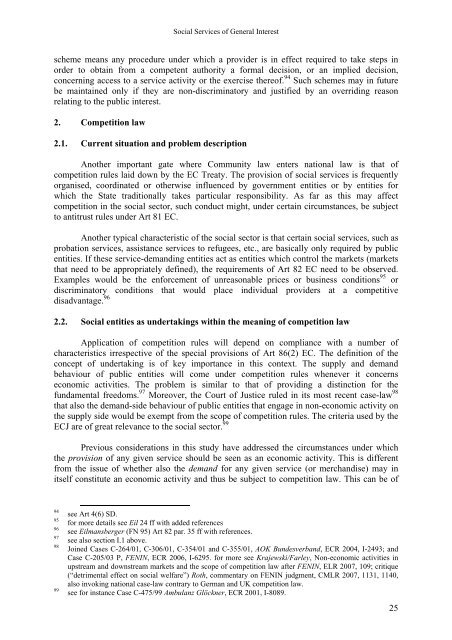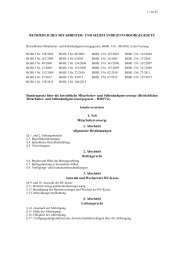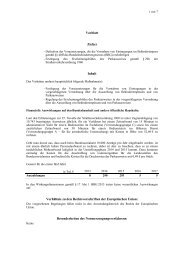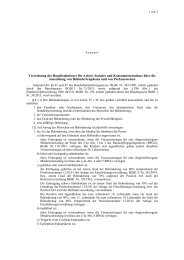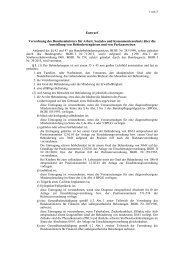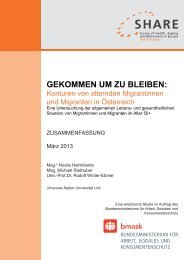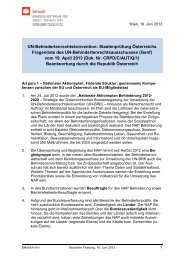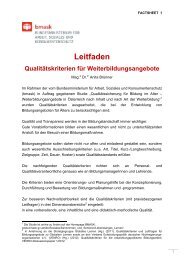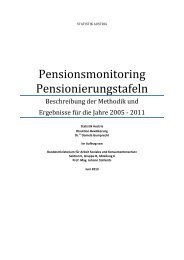Social Services of General Interest (SSGI)
Social Services of General Interest (SSGI)
Social Services of General Interest (SSGI)
You also want an ePaper? Increase the reach of your titles
YUMPU automatically turns print PDFs into web optimized ePapers that Google loves.
<strong>Social</strong> <strong>Services</strong> <strong>of</strong> <strong>General</strong> <strong>Interest</strong><br />
scheme means any procedure under which a provider is in effect required to take steps in<br />
order to obtain from a competent authority a formal decision, or an implied decision,<br />
concerning access to a service activity or the exercise there<strong>of</strong>. 94 Such schemes may in future<br />
be maintained only if they are non-discriminatory and justified by an overriding reason<br />
relating to the public interest.<br />
2. Competition law<br />
2.1. Current situation and problem description<br />
Another important gate where Community law enters national law is that <strong>of</strong><br />
competition rules laid down by the EC Treaty. The provision <strong>of</strong> social services is frequently<br />
organised, coordinated or otherwise influenced by government entities or by entities for<br />
which the State traditionally takes particular responsibility. As far as this may affect<br />
competition in the social sector, such conduct might, under certain circumstances, be subject<br />
to antitrust rules under Art 81 EC.<br />
Another typical characteristic <strong>of</strong> the social sector is that certain social services, such as<br />
probation services, assistance services to refugees, etc., are basically only required by public<br />
entities. If these service-demanding entities act as entities which control the markets (markets<br />
that need to be appropriately defined), the requirements <strong>of</strong> Art 82 EC need to be observed.<br />
Examples would be the enforcement <strong>of</strong> unreasonable prices or business conditions 95 or<br />
discriminatory conditions that would place individual providers at a competitive<br />
disadvantage. 96<br />
2.2. <strong>Social</strong> entities as undertakings within the meaning <strong>of</strong> competition law<br />
Application <strong>of</strong> competition rules will depend on compliance with a number <strong>of</strong><br />
characteristics irrespective <strong>of</strong> the special provisions <strong>of</strong> Art 86(2) EC. The definition <strong>of</strong> the<br />
concept <strong>of</strong> undertaking is <strong>of</strong> key importance in this context. The supply and demand<br />
behaviour <strong>of</strong> public entities will come under competition rules whenever it concerns<br />
economic activities. The problem is similar to that <strong>of</strong> providing a distinction for the<br />
fundamental freedoms. 97 Moreover, the Court <strong>of</strong> Justice ruled in its most recent case-law 98<br />
that also the demand-side behaviour <strong>of</strong> public entities that engage in non-economic activity on<br />
the supply side would be exempt from the scope <strong>of</strong> competition rules. The criteria used by the<br />
ECJ are <strong>of</strong> great relevance to the social sector. 99<br />
Previous considerations in this study have addressed the circumstances under which<br />
the provision <strong>of</strong> any given service should be seen as an economic activity. This is different<br />
from the issue <strong>of</strong> whether also the demand for any given service (or merchandise) may in<br />
itself constitute an economic activity and thus be subject to competition law. This can be <strong>of</strong><br />
94 see Art 4(6) SD.<br />
95 for more details see Eil 24 ff with added references<br />
96 see Eilmansberger (FN 95) Art 82 par. 35 ff with references.<br />
97 see also section I.1 above.<br />
98 Joined Cases C-264/01, C-306/01, C-354/01 and C-355/01, AOK Bundesverband, ECR 2004, I-2493; and<br />
Case C-205/03 P, FENIN, ECR 2006, I-6295. for more see Krajewski/Farley, Non-economic activities in<br />
upstream and downstream markets and the scope <strong>of</strong> competition law after FENIN, ELR 2007, 109; critique<br />
(“detrimental effect on social welfare”) Roth, commentary on FENIN judgment, CMLR 2007, 1131, 1140,<br />
also invoking national case-law contrary to German and UK competition law.<br />
99 see for instance Case C-475/99 Ambulanz Glöckner, ECR 2001, I-8089.<br />
25


